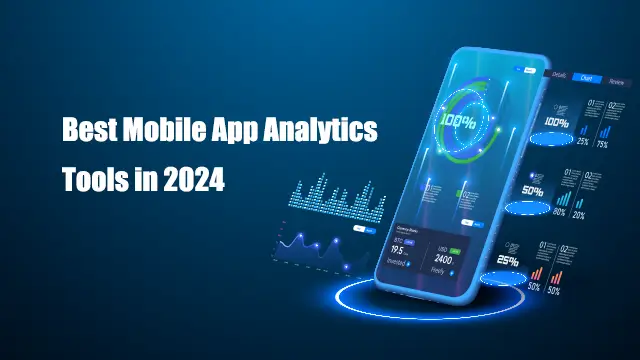Best Mobile App Analytics Tools in 2024
As the experts predicted, the smartphone user number is likely to reach 7.1 billion by the end of 2024 and 50% of US citizens spend about 5 to 6 hours on their device per day. With such a huge userbase,it's weird not to capture the chance and earn money from it. Analyse app data, in other words, check data and know how your real customer engage with your product, and how can you make progress to keep users active, is key to get app growth. This blog list main Mobile App Analytics tools and explains how do they work to help you better understanding app analytics and start your business.

Mobile app analytics plays a pivotal role in understanding user behavior, optimizing app performance, and driving growth. By utilizing valuable insights provided by mobile app analytics tools, developers and businesses can make informed decisions to enhance their app's user experience, engagement, and ultimately, its success. Let's delve into the world of mobile app analytics, discuss its significance, and showcase the best tools available in the market.
About Mobile App Analytics
Mobile app analytics refers to the collection, measurement, and interpretation of data related to mobile applications. It provides valuable insights into user behavior, demographics, engagement metrics, user acquisition, and retention rates. By analyzing these metrics, app developers and businesses can gain a comprehensive understanding of their app's performance and make data-driven decisions to improve its overall success.
Why do we need mobile analytics?
Mobile app analytics serves several crucial purposes, including:
1. User Behavior Analysis
By tracking user interactions within the app, analytics tools offer insights into user behavior, preferences, and usage patterns. This information helps optimize app design, features, and content to cater to user needs effectively.
2. Performance Enhancement
Analytics tools provide metrics on app performance, such as loading times, crashes, and error rates. This data helps identify and rectify performance issues, ensuring a smooth user experience.
3. Conversion Optimization
Understanding user behavior allows businesses to optimize conversion funnels, improve user acquisition strategies, and enhance in-app monetization through targeted advertisements and offers.
4. Personalization and Retention
By analyzing user engagement and retention rates, mobile analytics enables businesses to personalize user experiences, increase user satisfaction, and boost retention rates.
Who uses mobile app analytics tools?
Mobile app analytics tools are utilized by various stakeholders, including:
1. App Developers
Developers leverage analytics tools to gain insights into user behavior, app performance, and identify areas for improvement.
2. Product Managers
Product managers rely on mobile app analytics to monitor user engagement, track key performance indicators (KPIs), and make informed decisions to enhance the app's functionality and features.
3. Marketers
Marketers use mobile app analytics to measure the effectiveness of app marketing campaigns, optimize user acquisition, and analyze user demographics for targeted advertising.
4. Business Owners
Business owners utilize mobile app analytics to understand user preferences, improve customer satisfaction, and drive revenue growth through strategic decision-making.
5. Common User
By gaspering app trends, knowing which generation actives on which kind of app will inspire you to allocate your energy on the right app according to your stregth. For eaxmple, if you want to start your carrer selling items or become a influencer you can choose some apps that are not so competitive and get good results by analyse data before you make a decision. Free and reliable tools will help a lot.
Best Mobile App Analytics Tools:
1. Google Analytics for Mobile Apps
Rank and Reviews
Google Analytics is developed by Google LLC, rating 4.0 with more than 130591 reviews. It is Highly ranked in business app.
Main Features
Check Metrics and real time data. Comprehensive user behavior analysis, conversion tracking, real-time reporting, and integration with Google marketing tools. Abundant guides, tutorials, and ready-to-use solutions available. GA4's integration capabilities provide businesses with streamlined data onboarding from Google services such as Google Ads and Google AdSense. Additionally, the integration with Google BigQuery allows for advanced analysis by exporting event-level data. These integration features enhance the power of GA4, enabling businesses to make data-driven decisions and gain deeper insights into their digital marketing efforts and user behavior.
Price
Free with limitations; premium features available with Google Analytics 360.
2. Firebase Analytics
Main Features
Real-time event tracking, user segmentation, crash reporting, attribution tracking, and A/B testing. It provides unlimited reporting on up to 500 distinct events.
Price
Free/Paid.
3. Sensor Tower
Main Features
Provides solutions like Ad Intelligence, App Intelligence, Store Intelligence, Usage Intelligence, and Consumer Intelligence. With its data-driven approach, Sensor Tower enables users to analyze market trends, optimize ad strategies, assess user behavior, and track competitors Market intelligence, app store optimization, user acquisition insights, and competitor analysis. On March 19, Sensor Tower acquires market intelligence platform data.ai,which enriched its market data a lot.
4. Appsflyer
Main Features
A leading mobile app analytics and attribution platform. Its primary focus is on providing comprehensive measurement, tracking, and optimization solutions for mobile marketing campaigns. With AppsFlyer, businesses can accurately measure the impact of their marketing efforts, track user behavior across different platforms, and optimize their campaigns for better results. The platform offers features such as ROI measurement, creative optimization, marketing analytics, audience segmentation, fraud protection, and privacy-centric collaboration. AppsFlyer helps marketers make data-driven decisions and improve their return on investment by understanding the true impact of their marketing campaigns. It plays a crucial role in providing insights and actionable strategies for optimizing mobile marketing efforts.
In summary, AppsFlyer specializes in mobile app analytics, attribution, and optimization for marketing campaigns, helping businesses measure the impact of their marketing efforts and make data-driven decisions.
5. Appbrain
Main Features
A platform that offers a wide range of Android apps and games. It serves as a marketplace where users can discover and download apps. AppBrain also provides app promotion and monetization solutions for developers. Developers can promote their Android apps through AppBrain's network using cost-per-install pricing models and targeted user acquisition campaigns. Additionally, AppBrain offers monetization options through user-friendly app install ads, allowing developers to earn revenue by displaying ads in their apps. The platform also provides app ranking and performance tracking, allowing developers to analyze their app's market position, Google Play rankings, user engagement, and retention. It offers insights to optimize user acquisition strategies and improve app performance.
6. Sequoia One(sequone)
Sequoia One aims to help everyone better understand the performance, features, and user experience of various applications. Through our analysis tools and data, you can easily compare the strengths and weaknesses of different apps and find the one that meet all your needs.
See the Top Android Apps on the Google Play Charts by Free, Paid, and Top Grossing. Sequone provides a detailed visualization of the top ranking apps by category and country, along with app ranking and download changes as well as review ratings!
How to track user behavior in a mobile app?
To track user behavior in a mobile app, you typically need to implement mobile app tracking software or integrate a mobile analytics SDK (Software Development Kit) into your app. Here are the general steps to set up mobile app tracking:
Choose a mobile app analytics platform
Select a reliable mobile app analytics platform that suits your needs. Some popular options include Google Analytics for Mobile Apps, Firebase Analytics, and Appsflyer.
Sign up and create an account
Create an account on the chosen analytics platform. Provide the required information and follow the registration process.
Set up your app in the analytics platform
Once you have an account, create a new project or app within the analytics platform. Provide the necessary details such as the app name, platform (iOS, Android, etc.), and other relevant information.
Obtain the tracking SDK
Download the SDK provided by the analytics platform for your chosen mobile app platform (iOS or Android).
Integrate the SDK into your app
Incorporate the tracking SDK into your app's source code. This typically involves adding the SDK files and initializing the tracking functionality within your app's codebase. Follow the documentation and guidelines provided by the analytics platform to ensure correct implementation.
Define and track events
Determine the specific user actions or events you want to track within your app. Common examples include app launches, screen views, button clicks, in-app purchases, and user registrations. Use the provided SDK functions or methods to track these events at relevant points in your app's code.
Test and verify tracking
Test your app thoroughly to ensure that the tracking is functioning correctly. Verify that the events are being tracked and sent to the analytics platform accurately.
Analyze user behavior
Once your app is live and tracking data, you can log in to your analytics platform's dashboard to access and analyze user behavior data. Explore various metrics, reports, and visualizations to gain insights into user engagement, retention, conversion rates, and other relevant metrics.
Reminders:Remember to comply with privacy regulations and obtain user consent where necessary to ensure the ethical and legal use of user data. Additionally, always follow the guidelines provided by the analytics platform and stay updated with their documentation for any changes or additional features.
What's the biggest benefit of using app analytics and what are the main metrics to track?
Biggest benefit: Measuring Success and ROI with App Analytics
Measuring success and return on investment (ROI) with app analytics is essential for businesses to assess the effectiveness of their app strategies and make data-driven decisions.
Key metric for measuring success is user engagement.
By tracking metrics such as session duration, screen views, and in-app actions, businesses can assess how engaged users are with their app. Higher levels of user engagement indicate a successful app that is meeting user needs and providing value.
Another important metric is conversion rate.
By analyzing the conversion funnel and tracking metrics such as app downloads, in-app purchases, and sign-ups, businesses can determine how effective their app is at converting users into customers. A higher conversion rate indicates a successful app that is driving revenue and business growth.
Measure the impact of their marketing efforts
Furthermore, businesses should measure the impact of their marketing efforts using app analytics. By tracking metrics such as app downloads, user acquisition costs, and customer lifetime value, businesses can assess the ROI of their marketing campaigns. This information can help businesses optimize their marketing strategies and allocate resources effectively.
Qualitative feedback from users
In addition to these metrics, businesses should also consider qualitative feedback from users. This can be gathered through app reviews, surveys, and user feedback mechanisms. By analyzing this feedback, businesses can gain insights into user satisfaction, identify areas for improvement, and make data-driven decisions to enhance the app experience.
By measuring success and ROI with app analytics, businesses can assess the effectiveness of their app strategies, identify areas for improvement, and make data-driven decisions to drive better business outcomes in 2024. Excpt for those apps, there are other other app analytic tools like UXcam/Amplitude/CleverTap/ Flurry and others, which tool you should use should be based on your main purpose. Mobile app analytics tools are indispensable for app developers and businesses seeking to optimize their app's performance, enhance user experiences, and drive growth. By leveraging the insights provided by these tools, you can make data-driven decisions, improve user acquisition and retention rates, and ensure the long-term success of your mobile application. When selecting a mobile app analytics tool, consider your specific needs, budget, and desired features to choose the one that aligns best with your goals. With the right analytics tool in hand, you can unlock the full potential of your app and stay ahead in the competitive mobile app market.


I love sharing funny Apps or games so as to add joy in your life or enhance your productivity. My goal is to provide clear, actionable insights that make understanding Google Play trends easier and empower creators to succeed in a competitive market.
 More Popular Reports
More Popular Reports
-
 10 Warning Signs Your Heart Might Need AttentionEarly signs your heart needs a checkup Chest pain and shortness of breath causes When to see a doctor for heart symptoms Unexplained fatigue and heart health
10 Warning Signs Your Heart Might Need AttentionEarly signs your heart needs a checkup Chest pain and shortness of breath causes When to see a doctor for heart symptoms Unexplained fatigue and heart health -
 Christmas Budgeting for Normal People: Why I’m Letting Autopilot Handle My Investing This Holidayautomated investing app for beginners Christmas budgeting and investing best passive investing app
Christmas Budgeting for Normal People: Why I’m Letting Autopilot Handle My Investing This Holidayautomated investing app for beginners Christmas budgeting and investing best passive investing app

 Share
Share
